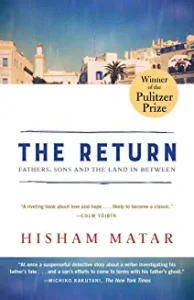The Return: Fathers, Sons, and the Land in Between by Hisham Matar 2016
The winner of the Pulitzer Prize and blurbed by Toibin, Mantel, and Carey, this book came with high expectations and it more than surpassed them.
It’s a tough book to read, describing in beautiful prose some very painful situations: the loss of Matar’s father, Jaballa, and the chaos, bloodshed, and terrible cruelty of Libya under Muumar Gaddafi. In 1969 Gaddafi overthrew the Libya’s nascent constitutional monarchy established in 1951 after the Italian defeat in WWII. He ruled with terror and theft until his assassination during the Arab Spring of 2011. Matar’s father had been a military attache in New York when Matar was born and was at the Libyan embassy in London at the time of Gaddafi’s coup. Seeing the undemocratic regime develop, he became a leader in the opposition and resistance to the dictator. The family fled to Kenya and then Cairo where Jaballa Matar directed militias in Chad and opposition in Libya. One day in 1990, he was kidnapped by the Egyptian intelligence service and taken to Tripoli’s Abu Salim prison along with two of his brothers and two nephews. Seen on rare occasions at the prison, he was never seen or heard from after 1996 when he was likely among 1270 political prisoners massacred at Abu Salim on Gaddafi’s orders.
‘The Return’ tells the story of Hisham Matar’s 25 year attempt to discover what had happened to his father. Settling and marrying in London, he had become a successful writer with a prize-winning novel in print when he, his mother, and older brother traveled back to Libya in 2012. Meeting his uncles and cousins who had been imprisoned for more than 19 years, he continued his relentless efforts to find any hint or proof of his father’s fate. Engaging Amnesty and Human Rights Watch and writing endless letters to the Libyan embassy, he finally took the bitter-tasting step of working with Gaddafi’s son to learn the fate of his father. Tragically, all attempts failed, and the book ends with the mystery unsolved.
Matar’s writing about his father and their relationship, about Libya and exile, about survivor guilt, and about life is exemplary. As in his book ‘A Month in Siena’, one of the pleasures of reading Matar is the skill with which he crafts words, sentences, and paragraphs. Here’s one example in talking about his reunion with his favorite uncle, Mahmoud: “His posture then—his pencil frame, the boyish agility of his movements—seemed to be an effort against erasure. It was at once specific yet part of our old human struggle against mortality. It cast a distance between him and the world that, like the fan shape of a fisherman’s net leaves when it touches the surface of the water, was only momentarily perceptible.”
Here’s another wonderful paragraph: “The country that separates fathers and sons has disoriented many travelers. It is very easy to get lost here. Telemachus, Edgar, Hamlet, and countless other sons, their private dramas ticking away in the silent hours, have sailed so far out into the uncertain distance between past and present that they seem adrift. They are men, like all men, who have come into the world through another man, a sponsor, opening the gate, and, if they are lucky, doing so gently, perhaps with a reassuring smile and an encouraging nudge on the shoulder. And the fathers must have known, having once themselves been sons, that the ghostly presence of their hand will remain throughout the years, to the end of time, and that no matter what burdens are laid on that shoulder or the number of kisses a lover plants there, perhaps knowingly driven by the secret wish to erase the claim of another, the shoulder will remain forever faithful, remembering that good man’s hand that had ushered them into the world. To be a man is to be a part of this chain of gratitude and remembering, of blame and forgetting, of surrender and rebellion, until a son’s gaze is made so wounded and keen that, on looking back, he sees nothing but shadows. With every passing day the father journeys further into his night, deeper into the fog, leaving behind remnants of himself and the monumental yet obvious fact, at once frustrating and merciful—-for how else is the son to continue living if he must not also forget—-that no matter how hard we try we can never entirely know our fathers.”
I had to put this book down many times and walk away to recapture my equanimity. I was totally engrossed with the details of the story of Matar and his family. When combined with the details of the cruelty and inhumane actions of the Gaddafi regime, it was too much on occasion. On the other hand, I kept putting the book down as it drew to a close because I didn’t want to find out that his quest for information about his father had failed as well as not wanting this haunting book to end. A great book!



